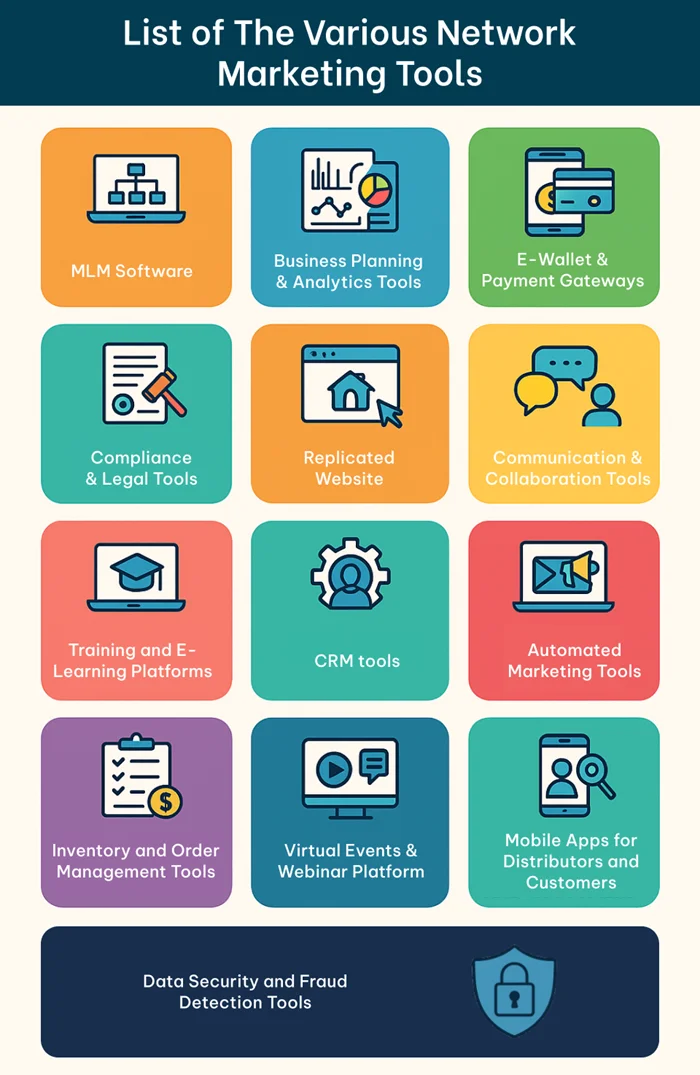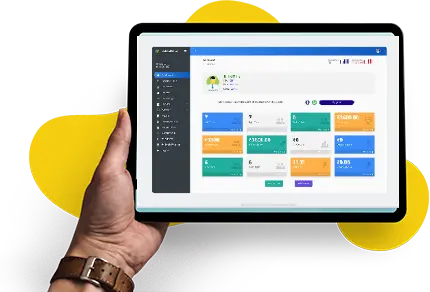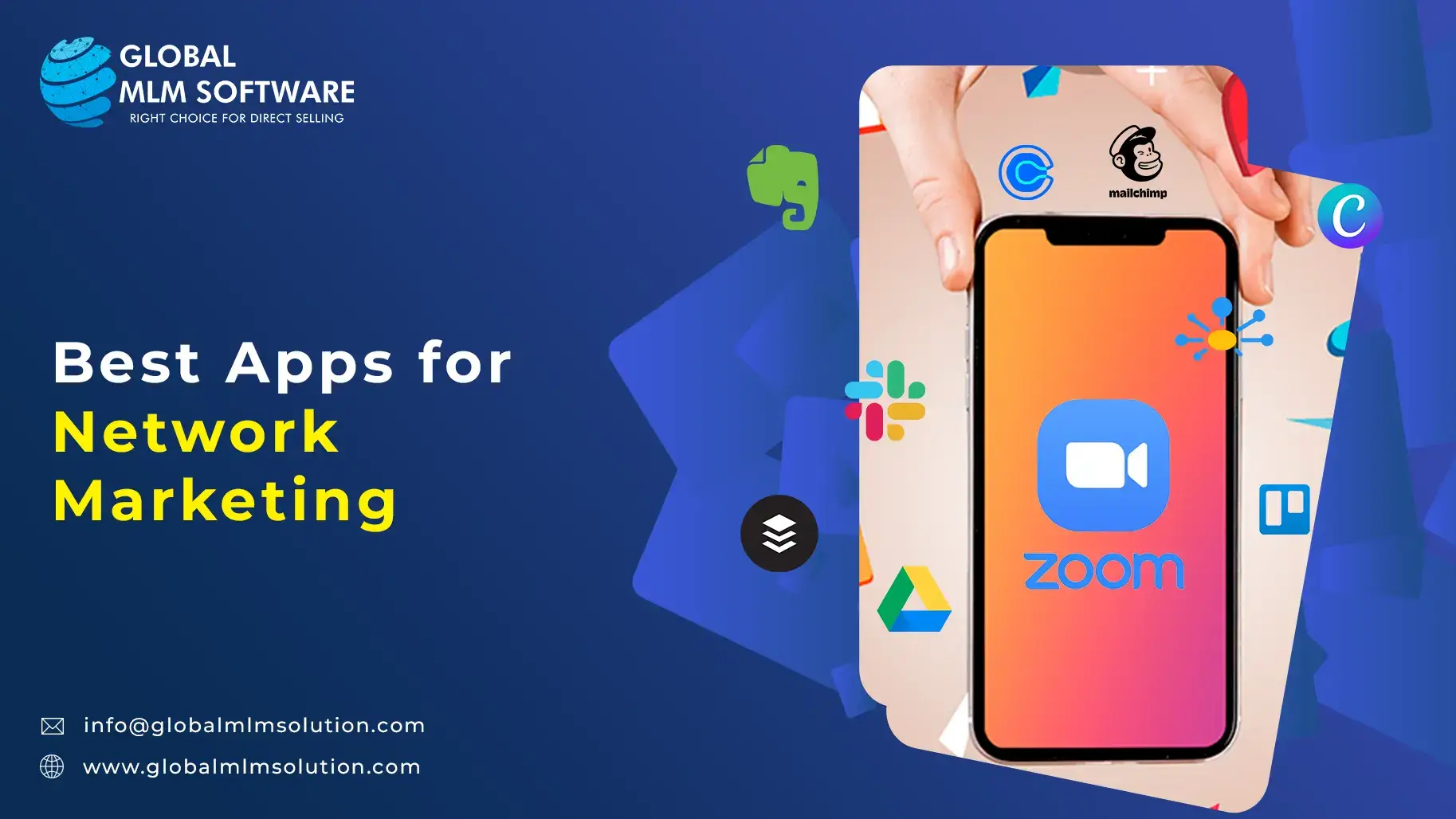Modern-day MLM operations are no longer confined to just inventory management, distributor onboarding, or keeping up with customers. MLM businesses have grown into complex ecosystems that thrive on technology, automation, and smart, data-driven decisions.
As an MLM business owner or decision-maker, you should recognize that relying solely on traditional methods is no longer sufficient. You need the right MLM business tools to keep up.
In this article, we’ll walk you through some of the top MLM tools designed to simplify daily operations, boost distributor engagement, ensure compliance, and give your business a competitive edge in an ever-changing industry.
This Article Contains:
Essential MLM Business Tools and Integrations
| Sl No | Tool Category | Purpose | Integration Capabilities |
|---|---|---|---|
| 1 | MLM Software | Manage distributors, commissions, and downline structures | CRM, e-wallets, payment gateways, replicated websites, analytics tools |
| 2 | Business Planning & Analytics | Track performance, forecast growth, and analyze metrics | MLM software, CRM, marketing automation platforms |
| 3 | E-Wallets & Payment Gateways | Secure payments and commission disbursements | MLM software, mobile apps, accounting/ERP systems |
| 4 | Compliance & Legal Tools | Ensure regulatory compliance and legal tracking | MLM software, reporting systems |
| 5 | Replicated Websites | Distributor-branded websites for product promotion | MLM software, CRM, marketing automation |
| 6 | Communication & Collaboration Tools | Messaging, file sharing, and team collaboration | CRM, project management application, virtual event platforms |
| 7 | Training & E-Learning Tools | Online courses, tutorials, live classes, certifications | MLM software, CRM, and communication platforms |
| 8 | CRM Tools | Manage customer relationships and leads | MLM software, marketing automation, e-wallets, analytics tools |
| 9 | Automated Marketing Tools | Email/SMS campaigns, lead nurturing, social scheduling | CRM, replicated websites, analytics platforms |
| 10 | Inventory & Order Management | Stock tracking, multi-location management, and order fulfillment | MLM software, e-commerce website, payment gateways, and reporting systems |
| 11 | Virtual Events & Webinars | Online training, meetings, and events | CRM, MLM software, marketing automation platforms |
| 12 | Mobile Apps | Mobile access for distributors and customers | MLM software, e-wallets, payment gateways |
| 13 | Data Security & Fraud Detection | Protect sensitive data and prevent fraudulent activities | MLM software, payment gateways, e-wallets, and compliance tools |
What are MLM Tools and Why Are They Important in 2025?
MLM tools are specialized digital solutions that are designed to help MLM businesses manage specific operations. These tools support critical functions such as distributor onboarding, commission tracking, genealogy management, communication, training, compliance, and customer engagement.
The MLM industry is constantly evolving. These MLM business tools give you the ability to scale faster, reduce human errors, and make smarter decisions backed by real-time data, transforming a traditional network marketing setup into a modern MLM business.
Transforming a traditional network marketing setup into a modern MLM business.
For example, Amway is one of the most well-known MLM companies. It has embraced a slew of digital MLM tools to streamline its growing operations across the world. The brand recently rolled out multiple digital assets like the “Smart Hub” app, personalized storefronts, and rich interactive catalogs within the MyBiz platform.
These tools allow their Independent Business Owners (IBOs) to manage sales, performance tracking, and customer interactions, all from their phones or tablets. This digital ecosystem has also helped Amway ensure its operations stay agile, responsive, and in tune with today’s always-connected distributors.
List of The Various Network Marketing Tools
This list contains 13 top MLM tools. We have selected them based on their ease of use, automation capabilities, scalability, integration support, affordability, and AI capabilities.

1) MLM Software
When starting an MLM business, one of the most important network marketing tools to have in place is reliable MLM software. It acts as the backbone of your business operations, supporting everything from compensation plan setup and genealogy management to distributor tracking and payout processing.
The right software also helps a business stay agile, scalable, and competitive in the long run. Some key features of MLM Software include:
Compensation Plan Integration: Supports unilevel, binary, matrix, hybrid, or custom plans.
Genealogy Tree Visualization: Hierarchical + tabular views with deep drill-downs.
Commission Engine: Auto-calculates weekly/monthly commissions with tax compliance.
Distributor Dashboard: Personalized KPIs, earnings and payout data, rank progression, and team performance data.
Multi-Currency & Multi-Language: Necessary for cross-border operations.
API Integration Layer: Seamless link with CRMs, ERPs, e-commerce stores, and other MLM business tools.
For MLM companies looking for reliable solutions, Global MLM software offers useful features like distributor tracking, commission calculations, team performance insights through dashboards, and customizable reporting modules.
2) Business Planning & Analytics Tools
An MLM business cannot be sustained without proper planning. You need a clear picture of how your business will perform in the real world before you begin rolling out your products and bringing in distributors. That’s where business planning and analytics tools come into play.
These tools work alongside your MLM software to help you see how your business is performing, spot opportunities, and make smarter, data-driven decisions.
Moreover, these tools also come with AI integration, further enhancing their capabilities. Some key features of such tools include:
Compensation Plan Simulation: Test and compare how different plans impact both company profits and distributor earnings.
Scenario Modeling: Run multiple “what if” outcomes to see how small changes ripple across your network.
KPI Dashboards: Keep a real-time track of revenue, order volumes, and distributor performance.
Data Warehousing: Centralizes all sales, distributor, and customer data in one place.
Predicting Sales Trends: Analyzes distributor activity and customer buying habits to predict high and low sales periods.
Identifying At-Risk Distributors: Helps reduce distributor churn rates by identifying inactive distributors and re-engaging them early.
Optimizing Compensation Structures: Helps optimize your compensation structure to maximize growth without eating into profits.
Some popular MLM business tools are Tableau, Power BI, and Qlik Sense. Tableau, for example, makes it easy to break down distributor and customer data by region or rank. This can be really helpful for keeping track of your network’s performance.
3) E-Wallet & Payment Gateways
Once your MLM business is up and running, money will start to flow in and out, right from product purchases to distributor payouts. A reliable E-wallet or a payment gateway will help you facilitate all transactions.
An e-wallet lets distributors safely store funds, make quick transactions, and receive payouts without any hassle.
Speaking of payment gateways, they connects your MLM platform to banks, securely processing online payments and keeping transactions accurate and on time. Together, they cut down errors, keep cash flowing smoothly, and help build trust with your team and customers.
Most e-wallets & payment gateways also come with added features like:
Instant Automated Payouts: Automates weekly or monthly commissions so your distributors are always paid on time.
Multi-Currency Support: Perfect for businesses that expand globally, with real-time conversion rates.
KYC Verification: Verifies identities to prevent fraud and meet international legal requirements.
Transaction Logs & Audit Trails: Every transaction is recorded, and immutable logs are added to make it easy to go through the necessary details during audits.
API Integrations: API integration gives you the ability to connect your e-wallet and payment gateways with multiple software using the API key.
Fraud Detection: Identifies unusual transactions and abnormal patterns before they escalate into costly problems.
Smart Payment Routing: Optimizes international transfers to reduce processing fees.
Real-Time Risk Scoring: Flags suspicious activity instantly to prevent fraud.
Some commonly used e-wallets and payment gateways include Stripe Connect, Payoneer, and PayPal. Payoneer, for example, can be particularly useful for MLM businesses as it allows payouts to be organized by region, rank, or team, simplifying the transaction management of complex distributor networks.
4) Compliance & Legal Tools
Compliance has always been an important aspect of any MLM business operations. Regulatory bodies are constantly updating compliance laws to safeguard the interests of distributors and customers alike.
With MLM companies under constant legal scrutiny, it is important to integrate compliance seamlessly into your business operations to safeguard against legal risks.
To achieve this, modern MLM legal compliance tools can come with packed features designed to monitor, manage, and simplify every step of legal and regulatory compliance, like:
Contract & Policy Management: Draft, store, and update distributor agreements and policies in one place.
Regulatory Checklists: The tool automatically updates in line with new amendments, changes, and notices issued by governing authorities such as the FTC (USA), DSA (Europe), and other regional regulators.
Audit Trails: Maintains a detailed, time-stamped record of distributor activities, order histories, and payout processes to provide full transparency and support compliance audits.
E-Signature Support: Allows new distributors to sign agreements digitally, securely, and legally.
Fraud & Misuse Monitoring: Detects unusual activity such as fake accounts or bulk product hoarding.
Real-time Risk Monitoring: AI scans compensation patterns, distributor activities, and customer engagement to detect the level of risk associated and warns when the risk is higher than MLM business’s risk appetite.
Policy Violation Alerts: Goes through distributor activities in real time and identifies if there are any violations of the business’s policies.
Smart Contracts (Blockchain): Tamper-proof commission rules that are both transparent and auditable.
For compliance management, tools like DocuSign, ComplyAdvantage, and LogicGate Risk Cloud can be very helpful. ComplyAdvantage, for instance, uses AI to monitor distributor activity and flag potential high-risk behavior early, which can help MLM businesses stay on top of compliance requirements.
5) Replicated Website
As your MLM business begins to expand, your distributors need professional and personalized replicated websites to share products and attract new customers. These replicated websites are a copy of the company’s official website but with distributor-specific features.
Replicated websites provide a quick way for distributors to start their business. It also ensures brand consistency across the distributor base and gives them a strong digital presence at the same time. More features include:
Personalized Distributor Pages: Automatically include distributor name, ID, and contact details.
Seamless Shopping Experience: Products, pricing, and promotions remain consistent with the main company website.
Lead Capture & Referral Tracking: Every customer or recruit is properly tagged to the right distributor.
SEO-Friendly Pages: Helps distributors rank in search engines without breaking brand guidelines.
Mobile Responsiveness: Optimized for smartphones, since most distributor interactions happen on mobile.
Centralized Updates: Any product change, price update, or promotion automatically reflects across all distributor websites.
Marketing Material Integration: Comes with integrated MLM marketing tools, like pre-approved banners, videos, brochures.
Social Media Integration: Social media assets and platforms can be embedded or downloaded. This makes sharing content easier while keeping brand messaging consistent across the network.
Many MLM companies use tools like Upline and Trinity Software to give their distributors professional, on-brand websites. At Global MLM Software, we offer replicated website tools that fit right into the MLM system. This makes it simpler to keep everything consistent and easy to manage.
6) Communication & Collaboration Tools
As your MLM company grows beyond a small circle, one of the biggest challenges is keeping everyone connected and informed. Distributors need real-time updates on promotions, training schedules, and rank advancements, while leaders require direct communication channels with their downlines.
Communication tools make this possible by creating a central hub for messaging, file sharing, and video calls. Meanwhile, MLM virtual collaboration tools provide interactive features like digital whiteboards, shared notes, and collaborative task boards.
These platforms not only reduce miscommunication but also help maintain motivation and alignment across thousands of distributors spread over cities or even countries.
Some features of these MLM tools include:
Real-Time Communication: Group chats, private messaging, and announcements to keep your team connected instantly.
Virtual Training & Meetings: Video and audio conferencing support leadership training sessions and team calls.
File Sharing: Easily share product catalogs, training PDFs, and compliance documents within the network.
Virtual Collaboration Tools: Interactive whiteboards, shared notes, and collaborative task boards allow teams to brainstorm, plan, and solve problems together in real time.
System Integration: APIs connect seamlessly with your CRM, distributor back office, and MLM software.
Secure Communication: End-to-end encryption ensures that sensitive business information stays safe.
Many MLM businesses use tools like Slack and Zoom to keep their teams connected. However, MLM businesses can opt for Microsoft Teams for a more secure and integrated collaboration experience.
7) Training and E- Learning Platforms
When your MLM organization begins onboarding new distributors at scale, traditional face-to-face training becomes impractical. Distributors need professional, flexible learning resources they can access anytime, whether it’s product knowledge, compliance rules, or recruitment strategies.
MLM Training and e-learning platforms transform complex onboarding into bite-sized, engaging lessons that fit into a busy distributor’s schedule. With gamification and progress tracking, these tools make learning exciting while giving the company measurable insights into distributor readiness.
Some basic features that these MLM training tools include:
Structured Training: Learning Management Systems (LMS) offer module-based course creation features to guide distributors step by step.
Gamified Learning: Badges, quizzes, and leaderboards make training engaging and motivating.
Professional Compatibility: Most e-learning platforms are SCORM and xAPI compatible, ensuring e-learning courses run seamlessly across different LMS platforms.
Mobile Access: Distributors can complete training anytime, anywhere, right from their smartphones.
Insightful Analytics: Dashboards help track course completion and highlight knowledge gaps.
Seamless Integration: Courses can be automatically assigned through the distributor's back office, keeping training organized and up-to-date.
In practice, many MLMs use Learning Management Systems like Absorb LMS, Docebo, or TalentLMS within their distributor back office. TalentLMS is often a popular choice because it offers a flexible interface and integrates smoothly with MLM systems.
8) CRM tools
Customers are the backbone of any MLM business, and keeping track of their needs, references, and buying patterns is vital for long-term MLM success. As your network expands, relying on spreadsheets or manual tracking can quickly become overwhelming.
CRM systems are the central hubs that help you manage every customer and distributor interaction in one place. It also helps you build targeted campaigns that maximize conversions. Other features of this network marketing tool include:
Lead Management: Capture leads, score them, and automate the sales pipeline.
Customer and Distributor Segmentation: Organize prospects and distributors, making it easier to target follow-ups and streamline lead generation.
Omnichannel Communication: Reach contacts through email, calls, chat, or social media.
Predictive Analytics: Use AI to anticipate buying patterns and identify potential churn.
Automation Workflows: Set reminders, update ranks, and manage renewals automatically.
Easy Integration: Connect seamlessly with MLM software, replicated websites, and MLM prospecting tools.
When it comes to CRM tools, there are plenty of options out there, like HubSpot, Zoho, Salesforce, and more. For MLM businesses, though, it helps to use a CRM designed with network marketing in mind, like the Global MLM CRM Software. This tool can integrate with your existing MLM software and let you manage multiple CRM functions from one central dashboard.
9) Automated Marketing Tools
Marketing requires consistent efforts, constant scaling, and personalization. Also, with thousands of prospects at different stages of engagement, relying solely on manual outreach is extremely unsustainable.
But today, entrepreneurs have automated MLM marketing tools that step in to handle this complexity rather seamlessly. These tools can send welcome emails, product updates, promotional reminders, or general follow-ups to reduce operational strain and help you nurture stronger relationships.
Modern MLM marketing tools come with a ton of features, like:
Automated Email & SMS Sequences: Set up messages triggered by user behavior, with tracking for opens, clicks, and conversions.
Social Media Scheduling: Plan and publish content across multiple platforms effortlessly.
A/B Testing & Optimization: Test different campaigns, track results, and refine future strategies; can integrate with MLM campaign management tools for automatic performance tracking.
Segmentation: Organize contacts into customers, prospects, and downlines for targeted communication.
Multi-Channel Drip Campaigns: Deliver consistent messaging across email, SMS, and social channels.
Real-Time Analytics & Conversion Tracking: Monitor campaign performance and see what’s driving results instantly.
Popular automated marketing tools include ActiveCampaign, MailChimp, and Klaviyo. Among these, ActiveCampaign is often used in MLMs for its strong segmentation and automation features, which help manage multiple campaigns efficiently.
10) Inventory and Order Management Tools
Inventory and order management is yet another crucial function of an MLM business that you should automated. As your distributor base expands and customer demand increases, manual tracking may lead to missed orders, delayed deliveries, and even stockouts.
However, MLM inventory and order management tools help eliminate these challenges. It provides a centralized system that tracks product levels, updated in real time, and automates reordering. Streamlining this process reduces operational efforts and builds trust and consistency among both the distributors and customers.
These tools come with a ton of features, like:
Real-Time Stock Tracking: Monitor inventory across multiple warehouses as it happens.
Automated Reordering: Predictive demand forecasting helps keep stock levels balanced.
Multi-Location Management: Manage inventory for distributors spread across multiple locations efficiently.
Order-Linked Commissions: Track orders while automatically connecting them to distributor commissions.
API Integration: Connect inventory with CRM, payment gateways, and MLM back-office systems.
Inventory Reports: Get insights on stockouts, overstock situations, and product performance.
Some popular options in the market include NetSuite, Cin7, and TradeGecko. NetSuite, in particular, is often chosen for its ability to support MLM-specific functionalities.
11) Virtual Events & Webinar Platform
Hosting training sessions, product launches, or distributor meetings no longer requires a physical venue. Virtual events and webinar platforms allow MLM companies to bring teams together from anywhere in the world, at any time.
These MLM tools also automate registrations, send reminders, and even take care of post-event engagement, creating a better experience for your network. They help keep distributors connected and motivated, without the logistical headaches of traditional events. Some features of these tools include:
High-Capacity Attendee Support: Handles events ranging from 100 to over 10,000 participants.
Branded Event Pages: Fully customizable pages featuring your company’s graphics and branding for a cohesive and professional appearance.
Breakout Rooms: Enables the division of a larger meeting into smaller, focused sessions where teams can collaborate, brainstorm, or network more effectively.
Interactive Features: Live chat, Q&A, and polls to boost engagement.
System Integration: Connects with CRMs and MLM platforms for smooth follow-ups.
Event Analytics: Tracks information regarding attendance, engagement, and replay views, and identifies patterns to understand attendees’ behavior and improve webinars accordingly.
Tools such as Hopin, Zoom Webinars, and GoToWebinar are widely used for online events. For MLM-specific needs, Hopin tends to offer features that fit well with network-based communities.
12) Mobile Apps for Distributors and Customers
Every distributor today runs their business from their phone. Mobile apps are no longer just optional. They allow distributors to check commissions, share product catalogs, or even enroll a new recruit, with just a tap.
For MLM companies, a branded mobile app is like giving each distributor a mini office in their pocket. Today, advanced MLM mobile apps come with features including:
Real-Time Business Updates & Commission Tracking: Keep distributors instantly informed about their performance and earnings.
Integrated E-Commerce Catalog: Allow immediate product sales directly through the platform.
Push Notifications: Alert distributors about rank advancements, promotions, and payouts.
Gamified Dashboards: Include leaderboards and gamification tools to motivate and engage your network.
Multilingual & Offline Support: Ensure accessibility for distributors anytime, anywhere.
Secure API Integration: Sync safely with MLM software and payment gateways.
There are many popular custom-built mobile app developers in the market, including Flutter, React Native, etc. These apps can be completely customized and integrated with your team’s existing MLM system.
13) Data Security and Fraud Detection Tools
As an MLM business, you are handling tons of sensitive data, including distributor information and payment details. That’s why you need strong data security and fraud detection tools that will safeguard your company’s data against hackers, identity theft, and online fraud.
Today, data security and fraud detection tools come with a ton of features, such as:
End-to-End Encryption: Protects sensitive MLM data like distributor details and payment records from interception using 256-bit AES encryption.
Multi-Factor Authentication (MFA): Ensures only authorized users access distributor portals and dashboards.
Anomaly Detection Algorithms: AI flags unusual activities such as sudden bulk purchases or account takeovers.
Role-Based Access Control (RBAC): Assigns system permissions based on a user’s role, ensuring team members can only access the features and data they need, which helps reduce security risks from unauthorized access.
Real-Time Transaction Monitoring: Identifies fraud patterns instantly to stop losses before they escalate.
Automated Compliance Reporting: Simplifies audits and ensures MLM companies meet regulations like GDPR or CCPA.
Some commonly used tools in this area include Okta, Kount, and Sift. Kount, in particular, offers AI-driven features tailored for e-commerce and direct sales operations.
Which MLM Tool is Right For You?
This list of top MLM tools includes some of the many options available in the market. However, choosing the right tools depends entirely on where your business is in its growth stage and what challenges you are looking to solve.
If you are a start-up, you might want to prioritize MLM software integrated with replicated websites, payment gateways, compliance, and data security tools to get off the ground smoothly. In fact, good and reliable MLM software is a necessity for all business sizes.
For mid-sized businesses, more advanced tools like inventory management, CRM systems, and virtual event platforms may be required to scale operations and keep distributors engaged. And for the larger enterprises, AI-driven analytics, enterprise-level compliance, and legal management tools can seem indispensable.
However, the key is to avoid integrating every other tool into your MLM ecosystem. Start with your business goals, identify bottlenecks, and then pick the ones that directly address them. Make sure they have multiple integration capabilities.
Closing Insights
At the end of the day, having the right arsenal of MLM tools for your business is as important as having great products or a passionate distributor team. A good mix of technology can take a lot of the heavy lifting off your shoulders and give your distributors the support they need.
But before choosing any MLM business tool, it’s important to research which tools will truly add value to your operations. A good and reliable MLM software should serve as the foundation, with other tools layered on to strengthen communication, marketing, and management capabilities.
With the right setup in place, you’ll be able to stay organized, strengthen distributor relationships, and keep your MLM moving forward with confidence.
FAQs
1. Who can benefit from using MLM tools?
Everyone in the MLM ecosystem, from company owners to team leaders and distributors, benefits from these MLM business tools. The tools make managing, tracking, and growing the business so much easier.
2. Are MLM tools beginner-friendly?
Yes! Most MLM tools are designed with simple dashboards and easy navigation, so even someone new to tech can get started quickly without a steep learning curve.
3. How do MLM tools help with compliance and fraud prevention?
There are specialized MLM legal compliance tools that track every transaction, payout, and activity in real time. This way they reduce errors, and instantly spot suspicious activities before they become a problem.
4. Can MLM tools integrate with existing CRMs, ERPs, and payment gateways?
Yes, most MLM tools are equipped with API integrations that allow them to connect seamlessly with popular CRMs, ERPs, and payment systems.
5. Do MLM tools support different compensation plans?
Yes, Modern network marketing tools are built to handle all kinds of plans, binary, unilevel, matrix, and even hybrid.
References
-
Amway Reference Guide
Disclaimer: Global MLM Software does not endorse any companies or products mentioned in this article. The content is derived from publicly available resources and does not favor any specific organizations, individuals or products.









